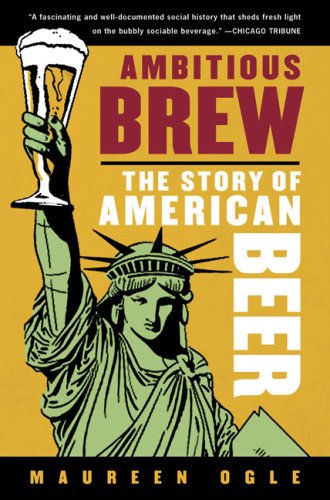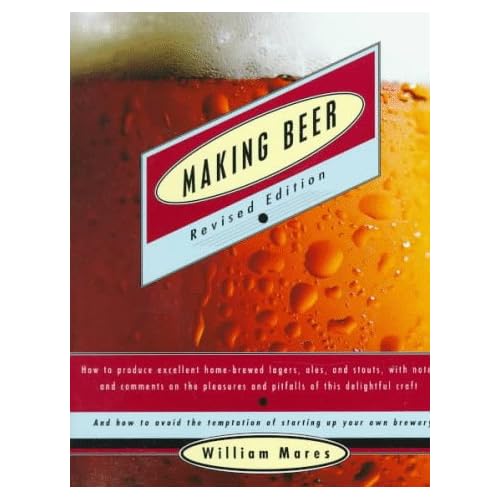A Pitcher Is Worth a Thousand Words
A review by Doug Brown
There is a myth among us beer snobs about the history of beer in America. It goes something like this: everyone used to drink full-bodied beers up until prohibition. After prohibition, the big brewers took over the industry, flooding the market with weak beer made more from rice than barley, because rice is cheaper. They aggressively drove everyone else out of business, and so now Americans drink this limpid swill because they don't have a choice. It makes a great story, particularly for fans of hearty ales and microbrews. The only problem is, as Ogle lays out in this fascinating history, the myth is almost completely untrue.
The first brewers in America were German, and made German style-lagers that were indeed much heartier than today's big brews (think Paulaner Salvator). However, these brewers had two troubles selling their beer. One was consistency; it was hard to make the same beer with the same flavor batch after batch. The other was that nobody other than German immigrants liked this style of beer; it was heavy, calorie rich, and not particularly refreshing on a hot day. For cities with large German populations, like Chicago and New York, this was fine. For everyone else, a new type of beer was needed.
The answer was found in Bohemia (today's Czech Republic), in the town of Plzn (also known as Pils). Folks here made a light lager, perfect after a hard day's work. This style was brought back to America, and named pilsener after its town of origin. Except there was a problem. You can't make pilsener with American six-row barley, because it's too protein rich. You end up with unprecipitated blobs of protein, sort of like drinking a lava lamp. Brewers toiled away and found a solution: mix the barley with adjuncts like white corn and rice. Here's where part of the myth dies -- rice is more expensive than barley. Yes, the big brewers use rice not to save money, but because it makes better beer. This new American style of pilsener was immensely popular, and the thick German-style lagers all but vanished (we're still back in the mid-late 1800s, by the way).
Then a friend of brewer Adolphus Busch asked for a special beer to supplement his wine dealership. The friend, Carl Conrad, had learned of a beer made in Budweis, a town in Bohemia. The Budweis-style beer that Busch crafted for his friend used Saaz hops from Germany and rice as an adjunct. It was more expensive to make than most other American beers. It was lighter in color, and subtler in flavor. The two named it after the town of origin: Budweiser. And the rest, as they say, is history. The new brew was a huge hit with American palates. Imitators sprang up, and soon most of the successful breweries were making a Budweis-style pilsener.
Breweries in large cities had all the business they needed within a couple miles of the brewery, so had little need to expand. Brewers in smaller cities like Milwaukee and St. Louis had to transport their beer elsewhere to expand their markets. As they shipped to more and more distant cities, their capacities grew. Thus, the fact that these cities didn't have large local markets ironically became the reason most of the major brewers were located there (similarly true later on for Coors). Big brewers also introduced assembly line automation decades before Henry Ford supposedly invented the concept.
In the late 1800s a temperance movement started gaining momentum. Interestingly, lager was previously not considered alcoholic, as it only had a 3.2 percent alcohol content. By the end of World War I, the movement was powerful enough to push through a constitutional amendment, and prohibition was born. Only the brewers with deep enough pockets were able to survive, though some eked along by brewing soft drinks or selling yeast. When prohibition was repealed over ten years later, the number of players in the field had been considerably reduced.
The next thirty or forty years were times of further consolidation. As more brewers fell on hard times due to decreased alcohol consumption by Americans, the larger brewers bought up the smaller ones -- or the smaller ones just went under. By the 1960s, there were few breweries left. Then the big breweries turned to marketing in a way they never had, tying in beer with sports, using clever mascots (remember the Hamm's bear, from "The land of sky blue waters"?), and doing everything else to get Americans drinking beer again. It worked for a while, but soon a subset of the fickle American palate wanted something other than Budweiser.
Enter a guy named Fritz Maytag, who in 1965 bought a defunct brewery in San Francisco called Anchor. After trying to sell the same kind of beer Anchor had been making, Maytag found out why the brewery had gone under. Once again, a new kind of beer was needed. He turned to ale, and made a brew called Anchor Steam. Restaurateurs loved it. The microbrew boom was born.
Today drinkers have a wider variety of beers to choose from than ever. The big breweries still dominate the business with their pilseners, but not because people don't have a choice. The majority of American beer drinkers really do like the light flavor. Go figure. The big breweries got big by caring about consistency, and using more expensive ingredients than the cheap malts and hops used by failed brewers. In short, they survived for all the of the same reasons people like craft beer today. I won't be switching from Deschutes to Bud anytime soon, but Ogle has diminished my dislike of the big brewers no small task, that. Whatever type of beer you prefer, Ambitious Brew makes for good reading while quaffing your favorite. Along with Ken Wells's entertaining romp Travels with Barley, this is highly recommended for any beer fans on your gift list (including yourself).






